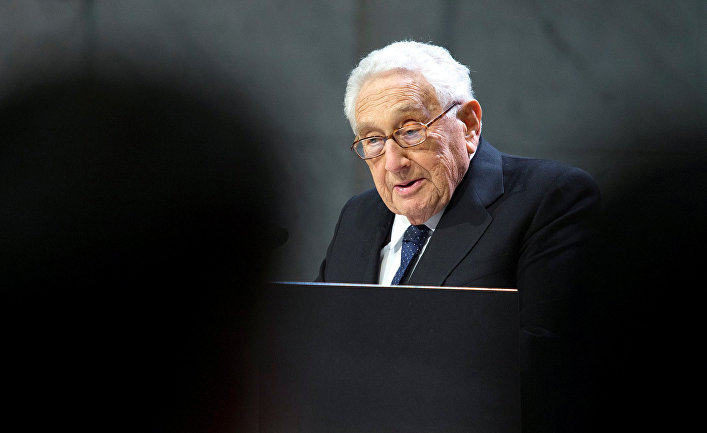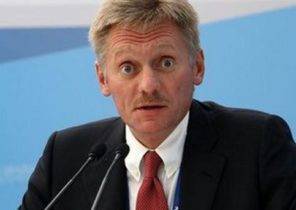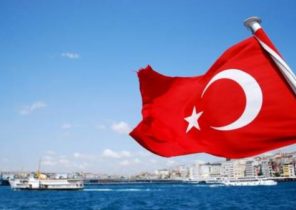
Henry Kissinger was a good year.
Mark Zuckerberg (Mark Zuckerberg) is promoting a book by a former Secretary of state “World order” (World Order), published in 2015, on Facebook. According to the Mogul of social media, and Kissinger says, “how can we build peaceful relationships around the world. This is very important because such is the world we want to create for our children.”
Hillary Clinton, who during the primaries had to defend their long-standing relationship with Kissinger, criticized “World order” for The Washington Post, emphasizing that the analysis in it, “in many respects in harmony with the broad strategy that the last 6 years underpinned the efforts of the Obama administration on building international peace, security and cooperation in the 21st century.”
President-elect Donald trump tried to use the aura of Kissinger “to strengthen their powers in foreign policy” when he visited him in may. Trump described the meeting in inimitable style:
“One of the greatest diplomats in the country and my friend… said, “Donald, I think your approach is incorrect. I thought it too hard. But you know what? Now all these countries are calling me, ‘What do we do, what are we to do as we please him?’ “”
On all parties Kissinger has an amazing effect. What makes his legacy so refreshingly meaningful?
Potential imperialists can go to his official biographer, Niall Ferguson the for answers. Harvard specialist on the restoration of the devil’s reputation (which it has done for the house of Rothschild and the British and American empires) argues that if we compare good (the US victory in the cold war) with the bad (casualties in strategically marginal countries), Kissinger will appear a hero.
Fortunately, for those of us who do not wish to carry out such calculations, is Greg Grandin, with his book “Shadow of Henry Kissinger: the long arm of the controversial policy of America.” In this book, the author does not succumb to the temptation to just list the crimes of Henry Kissinger, and seriously examines the worldview of the hero.
As the real trial of Henry Kissinger never going to happen, but the moral has already taken place, Grandin has chosen a different path: he understands why the ideas of Kissinger’s influence on American foreign policy for more than 50 years. Using Kissinger as a protagonist, Grandin finds the sources currently popular methods, like drone bombing of “safe havens” of alleged terrorists or “one percent Doctrine”, formulated by Dick Cheney after the events of September 11.
Instead of focusing on how he built the conspiracies and manipulated people seeking their immense power, Grandin reveals the ideology underlying the crimes of Henry Kissinger.
Relative realism
Kissinger has consistently described as an exemplary adherent of Realpolitik. Grandin shows Kissinger as a radical relativist, is not quite a Mature post-modernist and almost romantic, believing that you can create your own truth. This was the relativistic philosophy of history, Kissinger argues Grandin, and his main contribution to “American militarism” and “the revival of the Imperial presidency.” The book devotes to this feature of the worldview of Kissinger thorough investigation, which she deserves.
As we mentioned, Kissinger went to Harvard and therefore were heavily influenced by Oswald Spengler (Oswald Spengler), but the pessimistic determinism of the past, he replaced a call to action, the need to seize the initiative and create their own facts for themselves personally and in public policy.
This worldview does not distinguish between “good” and “bad.” In 1953, at the seminar at Harvard, Kissinger convincingly “used Kantian existentialism (the idea that human beings are absolutely free), to undermine Kantian morality. “We can hardly insist — he said, — at the same time that free, and on the necessity of the existence of our values””.
Moral requirements, considered Kissinger, I’m gonna let you walk the path of freedom, on both personal and national levels. Instead, he focused on how the perception of reality stimulates or suppresses freedom of action.
That is why secrecy was so important to him and his successor statesmen — think about the program Obama’s drone elimination. It allows them to control information and the environment, thus preparing a space for action.
Perception management, backed by Kissinger’s call to work with “real threats” (preferring small tactical nuclear weapons destroying everything around bombs) and make the enemy believe our ferocity, in spite of the “merciful” action timely little wars and carpet bombing.
“”Secrecy and reliability,” says Grandin, “mysteries and revelation” presents the true legacy of Kissinger and lead to the unified form of the modern Imperial authorities, that there is now.” While still a Professor at Harvard University, Kissinger worked on the transformation of his world to use as postulates of foreign policy. He advised the presidential candidate Nelson Rockefeller in 1969, became an adviser to Nixon on national security. While Nixon and his administration were in power, Kissinger successfully planned their way higher and higher on the ladder of power, “testing in practice the validity of their theories, which are at known imagination can help you master the inner course of history and affect it in their own interests.”
Kissinger learned of the obligations implied by its official role in controlling the qualitative “jump forward” to the Imperial presidency, turning the national security Council in the “Central node” of American foreign policy and placing itself on the top of the pyramid of information processing, decision-making and the imposition of punishments — all the possibilities shrouded in a cloud of secrecy.
The people and the state itself should control your own destiny, that was the basic principle of the Kissinger. But this cornerstone of American mythology means nothing without a spiritual component: working hard towards a goal, you can serve the government or oppose it.
Kissinger used this to accumulate and consolidate power. But Grandin pointedly notes that Daniel Ellsberg (the”Anti-Kissinger”) was the road to a completely different result, “speaking out against the war and betraying public top-secret documents.” He took a “huge risk” and “changed the course of history”, in full agreement with the philosophy of Kissinger, but much to the chagrin of his boss.
False realities
Grandin skillfully uses Kissinger, to discuss the development of the American state. Biographers often overestimate the influence they describe personality, but in the “Shadow of Henry Kissinger” is well defined balance between the influence of individual and structural development.
In the book “History as art” Bertrand Russell talks about one of the features of medieval historical works: they pay attention to structures, social forces and groups rather than specific individuals. The belief that “an individual is not considered and even those who are recognized as heroes — just the embodiment of social forces, if they have failed in their role, it would fulfill someone else”, is the “most destructive lie,” writes Russell.
The same goes for Kissinger. Although its influence was strengthened by the unprecedented dominance of the American state, it was his philosophy and personal qualities have propelled him higher and higher on the ladder of power. He wouldn’t be nearly as powerful outside of these institutional structures, but it is doubtful that many could achieve the same effect in the same terms — it was “outstanding role… in the creation of the world in which we now live.”
The infrastructure of terror in Asia, the middle East, Africa and Latin America, thriving today, were underpinned by its philosophy and continues to define American foreign policy.
Despite some important differences in the “extreme subjectivism of neo-conservatism” of President Bush had a lot in common with Kissinger. Karl Rove, senior Advisor to George Bush, repeated the philosophy Kissinger word for word. In conversation with journalist Ron Suskinda Rove said that people like Suskind belong to the “right”to what we call society, based on reality,” which he described as people “who believe that solutions are born due to your thorough study of the visible reality.” I nodded and murmured something about enlightenment principles and empiricism. He interrupted me. “The world is arranged differently. We now Empire and when we act, we create our own reality. And while you’re studying that reality — and carefully as you want — we act again, creating other realities, which you also can learn, that’s how things are. We are figures of history… and you, all of you, can only use what we’ve “done”.
As argued by Stephen Duncomb, the Right took the power of imagination and showmanship. Hold left policy based on the truth, to blow bubbles propaganda. In recent years, however, did not manage to combine these two approaches so as to obtain a stimulating prospect.
“I have a dream” changed “Prize for best name is Obama.” Instead of rioting students opposed to the status quo, we see reiseroute presidential election — the PR on their own. Trump sort of rode the wave of policy of formation of perception, which partly goes back to Kissinger. Elected President, of course, appeals to a different audience than did its predecessor, and from some points of view these two as far from each other — but, nevertheless, he is reminiscent of former Secretary of state with his ability to shrug off scandals and to create a false reality in which, however, trusts the audience.
There are no “safe havens”
On the downside books Grandin, one of them is a few small passages on the influence of Kissinger on international law. The author makes too many assumptions, stating: “Perhaps one of the most significant arguments put forward by Kissinger’s justification for his war in Cambodia, was the need to destroy the sanctuary of the enemy… This argument is so distracting from the concept of international law, 1970, that even was the reason why Thomas Schelling stopped with Kissinger relationship. To date, it does not cause problems”.
Mentioning the item of foreign policy, in which the destruction of “safe havens” named the cause of the outbreak of the war in Afghanistan and drone attacks in Pakistan, Yemen and Somalia, as well as manic quoting Obama “If you threaten America, you will not have safe havens”, Grandin convincingly shows how far the influence of Kissinger.
International law may be made by barbarians for barbarians, but it potentially deterrent effect should not be too easily cast aside. Although law and works, often in the interests of powerful States, it is also — at least theoretically — identifies and the extent to which States themselves can operate.
In normal operation Dinstein Yoram “War aggression and self-defense” do we find the legal justification of the barbarism of the type of war in Afghanistan. Despite American privilege, the law governing national self-defense, does not permit the use of “a purely preventive measure” against terrorist attacks and determines conditions of a necessity, proportionality and immediacy. When Grandin claims that the destruction of the “havens” of the enemy outside their own borders now “raises questions”, it becomes muddy ground.
We can say that his conviction reflects the unfortunate fact that the right tends towards the adoption of this principle, pushed by state practice and the rhetoric of the last time. And anyway, the fundamental changes that have already occurred, is still in the process of formation, and questioned. We must not give up until the final draw is not cast.
The cure for “political amnesia”
The influence of Kissinger really was “outstanding”, and most troubling, it seems, will never weaken. The only candidate who dared to oppose him, it’s Bernie Sanders: he called Kissinger “one of the most destructive Secretary of state in the modern history of this country” and accused it of strengthening the Khmer Rouge. Despite the fact that Clinton tried to Woo veteran policy, he did not want to support any of the candidates.
When trump boasted to a meeting with him, Kissinger denied it mildly, far-sighted not refusing in advance from the new opportunities that could bring election. In the middle of the book Grandin discusses how national security is tied to political amnesia. To create this “forgetfulness,” he writes, ambiguous political action and serves as a “question of technique”, rather concentrating on the “law of meaning” than on purpose. Added to this is an even more common method: to discuss controversial decisions as if they were a tactical call, which allows — to this day — to make endless remarks about what the Vietnam war was a “mistake” and not a crime.
In addition to amnesia, however, we have another Pentagon papers, which I received from WikiLeaks, Chelsea manning, Edward Snowden and others. But this is not enough, and Grandin says that American national security “as strong as ever”. At this point he agreed with Kissinger: “the Information itself is not knowledge; too much data can drown wisdom; the “truth” disclosed “facts” are not self-evident”.
Accusations such repeatedly received Noam Chomsky, whose decades of uninterrupted streams of facts often considered as insufficient — or even naive — theorists and ideologues who did not share the faith Chomsky in a person’s ability to get up and act. “Everybody already knows”, they said, so that supply someone information by itself will not change anything.
But although the fact that the security services “safer than ever” may be true, the exposure Snowden, the subsequent reports and the outrage they caused, actually reduced the power of the state. The increased awareness forced people to develop software for encryption, both independently and with the filing of corporations that felt compelled to run it. Was followed by significant legal and legislative victories.
Agree, the mere knowledge of facts does not necessarily inspire people to action. Information in itself may not be sufficient, but access to it is a prerequisite of neither more nor less to critical thinking and formation movement.
The more important question is who has access to this knowledge. Social and economic resources, limit public access, and then Grandin masterfully plays the role of a public intellectual, who critically sorts source documents to create an alternative history for all of us.
As with his other books, he did the work, to which people can turn when the conventional history does not meet their critical curiosity. In this regard, we very much hope that “the Shadow of Henry Kissinger” will be the classic reference it deserves to be.
Thank you Rebekah miño-Mahdavi (Rebecca Mignot-Mahdavi) for their help with this article.







